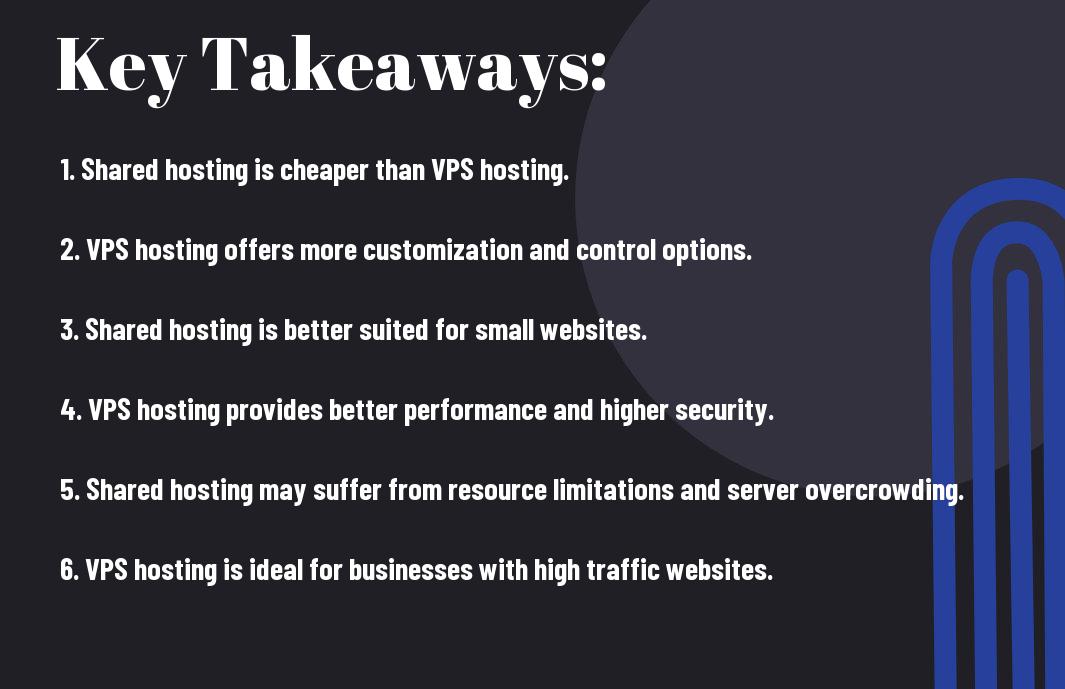If you’re in the market for web hosting, it’s crucial to understand the key differences between shared hosting and VPS hosting. While both options have their pros and cons, making the wrong choice can lead to performance issues, security vulnerabilities, and wasted resources. Shared hosting may seem like a cost-effective solution, but with it comes the risk of overcrowded servers, limited resources, and potential downtime. On the other hand, VPS hosting offers greater control, flexibility, and scalability, but it also requires more technical expertise and comes with a higher price tag. In this blog post, we’ll compare these two hosting options so you can make an informed decision that suits your website’s specific needs and goals.
Key Takeaways:
- Resource Allocation: With shared hosting, resources are shared among multiple websites, leading to potential slowdowns during high traffic periods. VPS hosting, on the other hand, provides dedicated resources, ensuring consistent performance for your website.
- Control and Customization: VPS hosting offers greater control and customization options, allowing users to install specific software, manage server settings, and make configuration changes. Shared hosting, however, is more limited in terms of customization and user control.
- Scalability and Security: VPS hosting provides greater scalability and security compared to shared hosting. With VPS, you can easily upgrade your resources as your website grows, and the isolated server environment offers enhanced security measures to protect your data.

Understanding Shared Hosting
While choosing a hosting plan, it’s important to understand the differences between shared hosting and VPS hosting. If you’re unsure about the distinction, you can read more about it here.
Definition of Shared Hosting
Shared hosting involves sharing a server and its resources with multiple other websites. This means that all the websites on that server utilize the same resources, such as CPU, memory, and disk space. It’s an affordable option for individuals and small businesses looking to establish an online presence.
Pros and Cons of Shared Hosting
When considering shared hosting, it’s important to weigh the advantages and disadvantages. Here are the pros and cons of shared hosting:
| Pros | Cons |
| Cost-effective | Limited resources |
| User-friendly | Security risks |
| Minimal technical maintenance | Performance may be affected by other websites |
| Shared cost of server maintenance | Limited customization options |
| Good for small to medium-sized websites | Limited control over server settings |
Ideal Use Cases for Shared Hosting
If you’re just starting with a personal blog, small business website, or an online portfolio, shared hosting might be ideal for you. It’s also a good option if you have a limited budget or aren’t expecting high traffic volumes initially.
Understanding VPS Hosting
Your website needs to be hosted on a server in order to be accessible to visitors on the internet. For many website owners, the choice often comes down to shared hosting or VPS hosting. VPS hosting, or Virtual Private Server hosting, offers more control, customization, and resources than shared hosting. In this section, we will delve into the details of VPS hosting and help you understand what it is all about.
Definition of VPS Hosting
VPS hosting is a type of web hosting where a physical server is virtually divided into multiple virtual servers. Each of these virtual servers operates independently, allowing users to have full root access to the server, as if they were on a dedicated server. This means you have more control and can customize the server environment to suit your specific needs.
Pros and Cons of VPS Hosting
When considering VPS hosting, it’s important to weigh the pros and cons to determine if it’s the right fit for your website. Here are some of the key advantages and disadvantages:
| Pros | Cons |
| Greater control and customization | Higher cost compared to shared hosting |
| Dedicated resources for your website | Requires technical knowledge for server management |
| Improved security and performance | Potential for server maintenance and monitoring |
| Scalability to handle increased traffic | May require you to handle software updates and installations |
Ideal Use Cases for VPS Hosting
VPS hosting is ideal for websites that require more resources and control than what shared hosting can offer. If your website experiences high traffic, runs resource-intensive applications, or needs a high level of security, VPS hosting may be the right solution for you. Additionally, if you want the flexibility to install custom software and make server configuration changes, VPS hosting gives you the freedom to do so.

Comparing Shared Hosting and VPS Hosting
Keep in mind that the choice between shared hosting and VPS hosting depends on your specific needs. If you’re uncertain about which option is best for you, How to compare Shared versus VPS hosting? [duplicate] is a great resource to help you make an informed decision.
Performance Comparison
When comparing shared hosting and VPS hosting, it’s important to consider the performance. With shared hosting, you are sharing resources with other websites, which can impact the speed and overall performance of your website. On the other hand, VPS hosting provides you with dedicated resources, offering better performance and faster loading times for your website.
Security Considerations
Security is a crucial aspect to consider when choosing between shared hosting and VPS hosting. With shared hosting, the security of your website can be compromised if another website on the same server experiences a security breach. VPS hosting, on the other hand, offers a higher level of security as your resources are isolated from others, reducing the risk of security vulnerabilities.
Scalability Differences
When it comes to scalability, VPS hosting provides more flexibility and scalability compared to shared hosting. With VPS hosting, you have the ability to easily upgrade your resources as your website grows, allowing for seamless scalability. On the other hand, shared hosting may limit your ability to expand resources, potentially hindering the growth of your website.
Cost Analysis
While shared hosting tends to be more affordable, it’s important to consider the long-term costs and benefits. VPS hosting may come at a slightly higher price, but the added performance, security, and scalability can make it a worthwhile investment for your website in the long run.
Making the Right Choice for Your Needs
Ultimately, the decision between shared hosting and VPS hosting should be based on your specific needs and goals for your website. Consider your performance, security, scalability, and budget requirements to make an informed decision. It’s important to weigh the most important, dangerous, and positive aspects of each option to determine the best fit for your website.
Conclusion: Comparing Shared Hosting vs. VPS Hosting
Following this comparison of shared hosting and VPS hosting, you can see that both options have their advantages and drawbacks. Shared hosting may be a more affordable option, but it lacks the resources and flexibility that VPS hosting provides. On the other hand, VPS hosting offers better performance, security, and control, but comes with a higher price tag. Ultimately, the choice between the two types of hosting will depend on your specific needs and budget. If you are just starting out and have a limited budget, shared hosting may be a good option. However, if you require more resources and customization, VPS hosting might be the better choice for you.
Comparing Shared Hosting vs. VPS Hosting
Q: What is shared hosting?
A: Shared hosting involves hosting multiple websites on the same server. This means resources such as CPU, RAM, and storage are shared among all the websites on the server.
Q: What is VPS hosting?
A: VPS hosting, or Virtual Private Server hosting, uses virtualization technology to provide users with their own dedicated resources within a shared environment.
Q: What are the main differences between shared hosting and VPS hosting?
A: The main difference is in the level of control and resources. With shared hosting, resources are shared among all websites on the server, while VPS hosting provides dedicated resources and more control over the server environment.
Q: Which is better for a small business website, shared hosting or VPS hosting?
A: For a small business website with moderate traffic, shared hosting may be sufficient. However, if the website requires more control over resources and performance, VPS hosting would be a better option.
Q: What are the advantages of VPS hosting over shared hosting?
A: VPS hosting offers better performance, scalability, and security compared to shared hosting. Users have more control over their server environment and can install custom software or make configuration changes without affecting other users.
CATEGORY:Web Hosting

